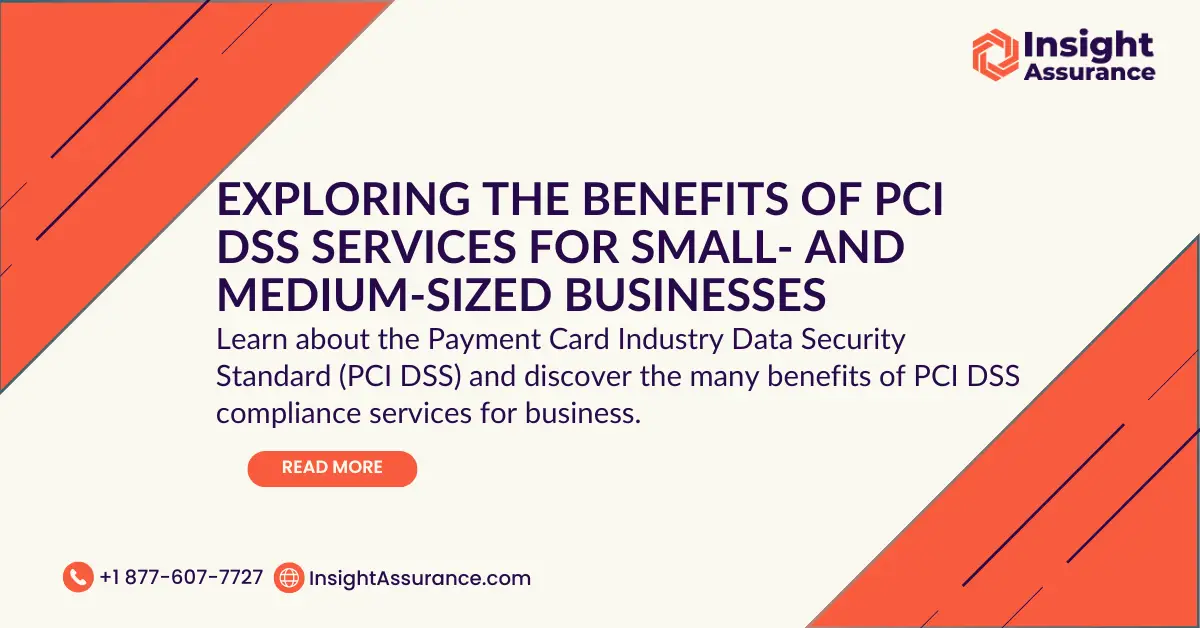According to the 2024 Verizon Data Breach Investigations Report, banking information features in nearly one in four confirmed data breaches — a stark reminder of why PCI DSS (Payment Card Industry Data Security Standard) remains pivotal for any organization processing card payments. As cyber-threat volumes rise, the standard has become the front-line defense for safeguarding sensitive data and protecting customer trust.
For small- and medium-sized enterprises (SMEs), the stakes are especially high. Limited resources, lean IT teams and InfoSec teams (if they exist), and rapid growth often create gaps that criminals exploit. Achieving and maintaining PCI DSS compliance not only helps prevent costly breaches but also demonstrates a commitment to robust data security, earning customer confidence and supporting long-term growth.
In today’s competitive landscape, where trust and security are paramount, SMEs that prioritize compliance set themselves apart as reliable and forward-thinking organizations. By engaging a quality security assessor, SMEs gain structured guidance, proven methodologies, and reassurance that their payment environments meet stringent security guidelines without draining internal bandwidth.
What Is PCI DSS Compliance and Why Does it Matter?
PCI DSS is a global data security standard established by the PCI Security Standards Council (PCI SSC). The goal of the standard is to protect payment card information wherever it is processed, stored, or transmitted. It outlines 12 core security requirements — ranging from encryption and access control to continuous monitoring — that service providers (payment processors, hosting providers, etc.) and merchants must follow to be considered PCI DSS compliant. These service providers are distinct from QSA companies, which help assess and validate PCI DSS compliance.
At its core, the standard aims to minimize fraud, prevent data breaches, and strengthen consumer confidence. By enforcing rigorous security controls, PCI DSS helps businesses reduce the likelihood of costly incidents, maintain uninterrupted payment processing privileges, and demonstrate accountability to customers, partners, and regulators.
For SMEs, these objectives translate into tangible advantages: fewer business disruptions, lower breach-related expenses, and a reputation for prioritizing data security. Understanding these goals sets the stage for tackling the next challenge — how resource-constrained organizations can actually achieve and maintain compliance without being overwhelmed.
Challenges SMEs Face in PCI DSS Compliance
Many small- and medium-sized businesses approach PCI DSS compliance with limited budgets, lean IT staff, and competing priorities. Implementing a full suite of security controls, such as firewalls, encryption, vulnerability scans, and robust access management, can feel overwhelming when day-to-day operations already stretch resources thin. Additionally, interpreting each PCI DSS requirement and mapping it to existing processes demands technical expertise that may be scarce in growing organizations.
Misconceptions about the standard often compound these pressures. Below are several myths that routinely derail compliance efforts and their real-world impact:
- “PCI DSS only applies to large retailers.” Believing this leaves SMEs exposed to fines, higher transaction fees, and reputational damage after a breach.
- “Outsourcing payment processing removes all responsibility.” While third-party processors help, the merchant remains accountable for secure software configurations, vendor management, and approved scanning vendor (ASV) reports.
- “A one-time audit makes the business PCI DSS compliant forever.” Compliance is an ongoing practice that requires continuous monitoring, policy updates, and annual self-assessment questionnaires (SAQs).
- “Encryption alone is enough to meet every security requirement.” The standard also demands strong authentication, log monitoring, and formal risk assessments to create comprehensive protection.
- “Implementing PCI DSS controls will slow down business operations.” When done correctly, the controls streamline workflows, reduce incident downtime, and improve overall efficiency.
Even if a company uses encryption, if it lacks robust monitoring and access controls, it could have critical vulnerabilities. By partnering with a PCI DSS qualified security assessor (QSA) company, retailers can implement regular vulnerability scans, employee security training, and a formal risk assessment process, reducing future risks and boosting customer trust. Partnering with a QSA company equips SMEs with targeted expertise, scalable tools, and hands-on support to overcome them quickly and efficiently.
How PCI DSS Services Simplify the Process
QSA consulting services act as an extension of an SME’s team, translating complex security standards into clear, actionable steps. Qualified Security Assessors leverage proven methodologies to scope the environment, identify gaps, and align existing security controls with each PCI DSS requirement, avoiding lots of internal trial and error.
Beyond expertise, a QSA company — such as Insight Assurance — offers structured workflows and technology platforms that guide organizations through every phase of PCI compliance. These tools automate evidence collection, track remediation tasks, and generate documentation that satisfies auditors, regulators, and acquiring banks, all while preserving day-to-day operational bandwidth.
The following offerings illustrate how PCI DSS compliance services transform a daunting mandate into a manageable project:
- Risk assessments can pinpoint vulnerabilities, prioritize remediation, and reduce data breach exposure.
- Detailed gap analyses map current practices against PCI security standards to create an actionable roadmap.
- SAQ guidance ensures answers correctly reflect the control environment and speed approval.
- ASV vulnerability scans and penetration testing validate external defenses.
- Continuous compliance monitoring and real-time dashboards can alert teams when security requirements drift out of scope.
For example, an organization might leverage a PCI DSS QSA company to automate evidence collection and integrate compliance dashboards into its IT systems. This approach can streamline the documentation process and significantly reduce the time spent on audits. As a result, the organization can achieve compliance and reduce the resources required for security monitoring tasks.
By combining deep regulatory knowledge, practical tools, and ongoing support, these services strip away uncertainty and free SMEs to focus on growth.
Key Benefits of PCI DSS Compliance Services for SMEs
When SMEs engage a QSA company, PCI DSS compliance shifts from being a burden to becoming a strategic asset. The right partnership not only strengthens security controls but also drives broader business value.
Below is a closer look at the advantages that resonate most with growing organizations:
- Enhanced data security that hardens networks against malware, ransomware, and cardholder data breaches, safeguarding revenue and reputation.
- Consistent regulatory compliance with PCI security standards, reducing the risk of fines, higher interchange fees, and costly legal battles.
- Elevated customer trust through visible proof that the business meets a globally recognized security standard, encouraging repeat purchases and brand loyalty.
- Streamlined operations thanks to documented processes, automated evidence collection, and clear remediation plans that cut administrative overhead.
- Faster sales cycles when partners and customers readily accept a PCI DSS compliant posture, minimizing lengthy security questionnaires.
- Reduced likelihood of downtime and incident-response costs, because proactive vulnerability scanning and penetration testing identify weaknesses early.
- Competitive differentiation, positioning the company as a payment security leader while peers may still struggle with baseline controls.
For example, a business in the hospitality sector may need to meet PCI DSS standards in order to retain partnerships with major travel agencies. By leveraging compliance services, the business can not only maintain those partnerships, but actually improve its internal IT efficiency through streamlined access controls and detailed policy templates. This enhances both security and business operations.
As another example, a small SaaS provider specializing in subscription billing services can utilize a QSA Company to implement penetration testing and secure software development practices. This effort can protect its systems and enable it to quickly onboard clients, increasing revenue.
Beyond mitigating risk, these benefits translate into a measurable edge. A strong compliance story opens doors to new markets, reassures investors, and creates a foundation for future certifications such as SOC 2 or ISO 27001 — advantages that can accelerate growth and valuation.
Cost Considerations and ROI for PCI DSS Compliance Services
The price tag for PCI DSS compliance services varies by business size, transaction volume, and existing security maturity. Typical expenses include gap assessments, SAQ support, vulnerability scans, penetration testing, and continuous monitoring tools.
While the upfront investment may appear steep, the long-term cost benefit favors proactive compliance. A single data breach can cost an SME well over $200,000 when factoring in forensic investigations, card reissuance fees, lost sales, and reputational damage. By contrast, managed compliance services help prevent incidents, lower cyber-insurance premiums, and eliminate non-compliance penalties that can reach six figures per month. Over time, these savings offset initial project fees and contribute directly to the bottom line.
Beyond hard numbers, the return on investment extends to accelerated sales cycles, partner confidence, and improved operational efficiency — benefits that compound as the organization scales. Understanding both cost and value frames the next crucial decision: selecting a qualified QSA company who can advise on PCI DSS compliance.
Choosing the Right PCI DSS Compliance QSA Firm
Selecting the ideal TPSP can be the difference between a smooth compliance journey and an ongoing struggle. SMEs should weigh the following considerations before signing any engagement:
- Proven PCI DSS expertise, evidenced by QSA certifications and a track record of successful audits across industries.
- Scalable service offerings that align with current needs and which can adapt as transaction volumes grow or new payment channels emerge.
- Comprehensive toolsets — such as compliance portals, secure document repositories, and automated vulnerability scanning — that reduce manual effort.
- Transparent pricing models that clearly outline project phases, deliverables, and any additional costs for remediation or annual maintenance.
- Strong communication practices, including a dedicated point of contact and a 24-hour service-level agreement for critical questions.
- Integration with existing security controls and secure software development workflows to avoid redundant investments.
- Positive client references and case studies demonstrating measurable reductions in data breach risk and audit preparation time.
Additionally, SMEs should look for QSAs that go beyond just helping with compliance. A QSA who is a trusted advisor should provide actionable insights, tailored recommendations, and ongoing education that empowers internal teams to maintain compliance independently over time. For example, a QSA firm offering quarterly security awareness training can significantly reduce the likelihood of breaches caused by human error.
Equally critical is the QSA company’s commitment to ongoing support and monitoring. PCI DSS compliance doesn’t end with a successful SAQ or Report on Compliance; it demands regular vulnerability scans, policy reviews, and staff training. A QSA offering continuous oversight ensures that security controls stay effective, helps tackle new threats swiftly, and supports annual re-validation.
With these criteria in mind, SMEs can confidently choose a QSA capable of simplifying compliance while amplifying security. To experience a streamlined approach backed by Big 4 expertise and client-centric service, contact Insight Assurance for a free consultation on PCI DSS compliance services.
Empowering SMEs With Simplified PCI DSS Compliance
PCI DSS compliance no longer has to be a complex, resource-draining exercise. With the right guidance, small and medium-sized enterprises can transform payment security from a regulatory hurdle into a growth catalyst.
QSA consulting services deliver expertise, technology, and continuous support to safeguard cardholder data, earn customer trust, and unlock new market opportunities — all while enabling businesses to focus on their core objectives. For SMEs, this transformation is not just about meeting regulatory requirements; it’s about creating a culture of security that drives long-term success.
Don’t wait until a breach occurs to take action. Proactively addressing PCI DSS compliance can enhance your reputation, reduce risks, and open the door to new opportunities. Contact Insight Assurance today for a free consultation and take the first step toward simplified compliance and stronger security.


